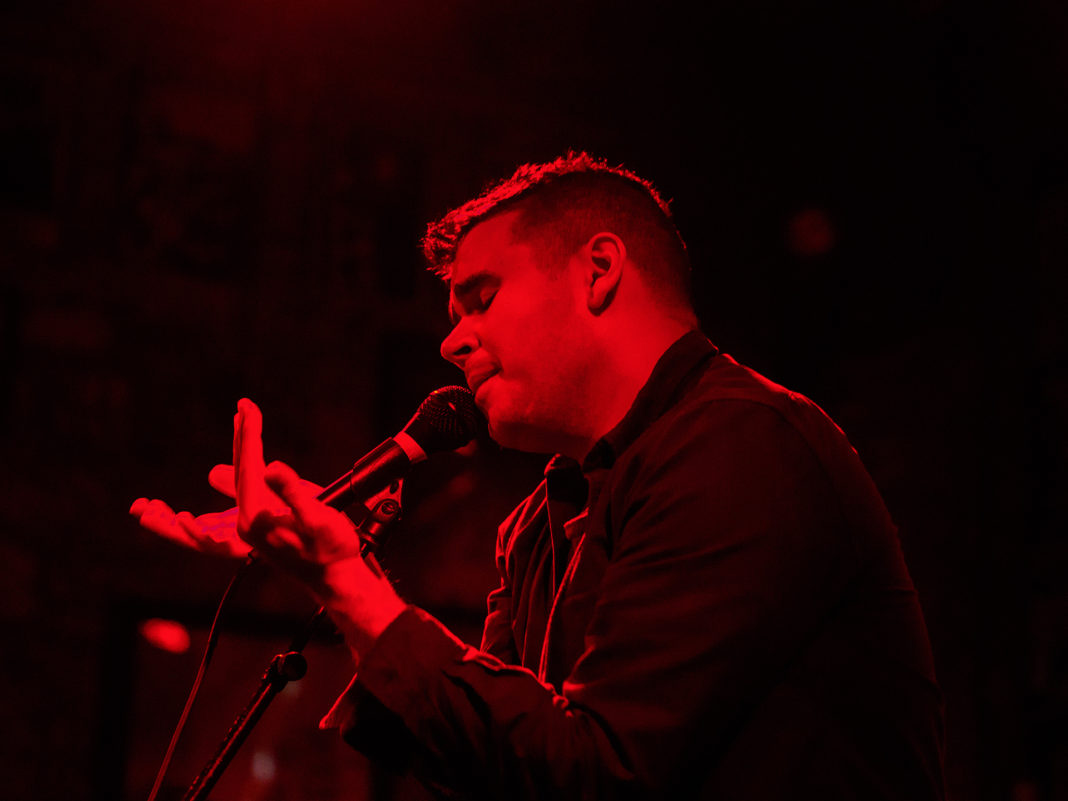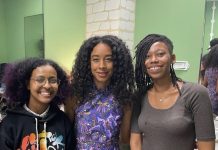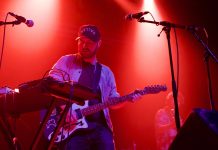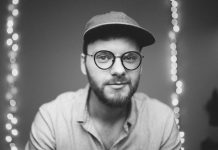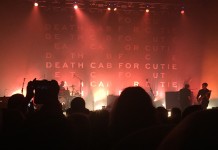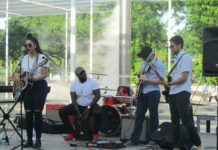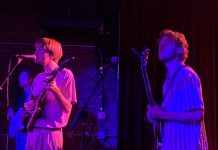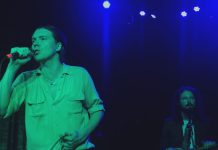Rostam Batmanglij is a force in the music industry to be reckoned with, with his production credits including some of the biggest hits in recent history. Last September, he emerged from behind the production curtain and landed gracefully in the spotlight with his debut solo album Half-Light, a 52-minute reminder of just how multi-faceted his musical talents are. It’s an album that I have endless words for, a modicum of which you can read here.
On the Texas leg of his tour for Half-Light, Rostam sat down with me at Drugstore Cowboy in Deep Ellum to discuss a few tracks off the album, how his creative inspiration shifts as he wavers between production and songwriting, and how a universal nature can connect things like car design and making pop music. Below is the transcription for the conversation that you can listen to here.
Dawood: The first album you ever produced was the 2008 Vampire Weekend album. You’ve come a long way since then obviously, and your production discography has grown to be, you could say, a behemoth. How do you view that album now that 10 years have passed? Is it a feeling of nostalgia, or do you look at it and think in terms of “I wish I had done this better, or that better”?
Rostam: There’s definitely things, small things that I would like to still revise and maybe there’ll be a chance to for some kind of reissue. I think I’m proud of it. I don’t know, I probably haven’t listened to all the songs – I’ll hear a song from time to time in a store and I’ll be like “What is this? This sounds pretty good!”, then I’ll be like oh, it’s from that record.
Dawood: What are some things that you know now, 10 years later into your production career, that you wish you had known then?
Rostam: Well you know, when I was that age – which was I think about 23 – I felt very certain that I knew best. That was kind of my attitude, and I didn’t trust very many people, you know? I guess what I’m saying is I was very stubborn in a way, and I was very sure of myself in a way. I feel like I’ve become less sure of myself now, 11 or 12 years later. I’m more open, I think, which is interesting. I don’t know how that affects it.
Dawood: You’ve in the past cited Dave Longstreth of the Dirty Projectors as an inspiration for pushing boundaries. You mentioned back when you guys were in college, you would see this music he was making and it kind of inspired you to do what you wanted to do with your music. Since that time has passed, how has your inspiration shifted, especially now that you’re more at the front with Half-Light, your solo debut album? How has that inspiration shifted from, not only when you were younger, but from a production standpoint to a singer / instrumentalist standpoint?
Rostam: I’ll start by just saying Dave is someone who, when I first met him I think he’d recorded his first three albums as Dirty Projectors already. They were recorded.
Dawood: And that was back when?
Rostam: That was in 2003. They were done, it was just a matter of putting them out in sequence. He was very sure of what he was after, musically. Now at this point, Dave and I will get together and play each other stuff that we’re working on, and it’s interesting to see how he has a lot of the same goals that he had when we were both in college majoring in music, and I do too. I don’t know how much those goals have changed for me, what I’m interested in doing. I just feel like there’s more to do. I still feel like there’s more to do, I don’t feel like I’m out of ideas.
Dawood: Well that’s good, I hope you’re not. In terms of creative inspiration for production, is that different from the inspiration that you glean for songwriting, or for orchestrating instruments?
Rostam: I’ll start songs in different ways. I’d say on the record Half-Light, about half the songs started with drums that I was programming. Then I was building tracks around the beats, and that was the beginning. So it was beat-driven, and that’s also the case for if I have a writing session with another artist that I’m producing. We get in the room and there’s nothing there, and I start building a drum track, and everything kind of stems from that. That said, I don’t think it matters how you do songwriting, it just matters that you care about it. If you feel like a chorus could be better, you try to make it better. If that means rewriting the lyrics, or rewriting the melodies, or changing the chords, changing the drums, whatever it is, I think it’s just about caring and about being open to it. I think that’s really what production is too, it’s about making the most of the song, making the most out of an idea, and taking it as far as you can go.
Dawood: So you wouldn’t separate production and songwriting, in creative terms?
Rostam: You know that’s interesting, I was thinking about exactly that with regards to the song “Kiss” by Prince. I think of that as one of the greatest productions of all time, and I don’t think it could exist if there wasn’t already a song there that was an excellently written song. You can actually listen to Prince’s demo, the acoustic guitar demo of the song. He wrote it for this band Maserati that he was producing, then he took it away from them. That’s how the story goes, and I was just thinking that they have to work together. Honestly, the most dazzling production of all time isn’t going to connect with anyone if the song isn’t good.
Dawood: With Half-Light specifically, what was your vision or idea for how the album would flow? From the night that it’s come out, I’ve sat down and listened to that album in its entirety several times, and there are definitely different types of tracks on that album, and a lot of them seem to have almost like… sister tracks. Whether it be the title track and “I Will See You Again”, or the percussion style of “Wood” and “When”, what was your idea for how that album would flow chronologically?
Rostam: I guess I just wanted it to… flow. I did go back and forth about the track list for about a three-month period between having the songs, and then the song “Rudy” was actually one that I had not expected I would finish for this record. I finished it when the rest of the album was done, because I felt like it needed that.
Dawood: So after the album had been finished, you saw “Rudy” and you decided you wanted it to be on the album?
Rostam: Well, I started “Rudy” in 2009, and I had recorded this crazy sax solo that I thought was one of the best things I’d ever done, and I didn’t know what to do with the song. At one point there was supposed to be three different reggae songs on the album. Like you said about the sister tracks, there was supposed to be trilogies of tracks. There were different periods where I had different ideas about that stuff, but I don’t know, after making this record I’m very interested in the idea of making a record that has a super consistent palette. Let’s see if it’s possible, I don’t know if it’s possible for me to do that.
Dawood: Any ideas or examples of something like that that you’d want to make?
Rostam: Like the song “Pink Moon” for example. It’s from an album called Pink Moon, and the album really only has guitar and vocals, with piano on one song additional to the guitar and vocals. I’m curious about trying to make a record like that, that has that level of cohesion. We’ll see if it’s possible.
Dawood: Going back to the track list and one particular track, “Bike Dream”. You’ve referenced before the fact that you had a very formative experience in a planetarium whenever you were a kid. Could you expand a little more on that formative experience and how it contributed to not only “Bike Dream” but, from that young of an age, if it instilled something in you that you still use throughout all of your work?
Rostam: Yeah, I guess it’s just like the kind of celestial string sounds, celestial synth tones, there was something about – I guess growing up in the 80s, I was born in ’83, I guess I heard them as a kid and they stuck with me and I was interested in using them in my music at some point.
Dawood: So even at that time you knew you were going to make music, or no?
Rostam: No, I thought I would make art, like painting. And car design, I thought I would be a car designer. I still would like to pursue a career in car design at some point in my life, I don’t know when that’ll be.
Dawood: That’s a really specific field of interest that I didn’t even consider as a career path.
Rostam: To me, car design is kind of like making pop songs because there’s this opportunity to create something that everybody can access that, if you want it to be, can be art. There’s some cars that are on the road that, when they pass by, everybody turns their head. They have an immediate connection. Why? To me, there’s something very powerful about that universality, in the same way that you can be walking down the street and hearing, like…
Dawood: …I mean, I’ll say it, “Cut To The Feeling” by Carly Rae Jepsen.
Rostam: Sure, exactly. Anyone can feel something from hearing that song, and have a direct connection to it. I guess I’m kind of interested in that in art, and that’s actually why I didn’t want to be a painter. I don’t think you get to do that as a painter in 2018.
Dawood: Do you think that it lacks universality in that everybody has a very specific takeaway from the same piece of art, or why do you feel that visually speaking you can’t get the same thing?
Rostam: Because when you’re a painter, you’re making work for rich older people to hang in their living rooms, or just to buy and put in storage. Whatever it happens to be, it’s very hard to make paintings and have them reach people your own age.
Dawood: I talked a little bit about “Wood” earlier, and that was – what was the first single that you released from [Half-Light]?
Rostam: It was “Wood”, I released it on SoundCloud in 2011.
Dawood: A long time ago, yeah. I remember hearing “Don’t Let It Get To You” for the first time – I think it was on my Discover Weekly or something – and I remember I became intrigued then. But whenever I heard “Wood” specifically, there was something there that I hadn’t heard before, and it was a Middle Eastern influence in a song that I was able to enjoy and relate to. Not that I didn’t enjoy the music that my dad would listen to when we were growing up, but it was a very specific instance of it. It starts with those strings and I remember enjoying and thinking it wasn’t something I’d really heard in my playlists before, and as soon as the percussion hit I was like, immediately swept back to some family wedding I’d been to when I was six years old or something. “When” also has the same Eastern-style percussion, and not only in those two songs but in your songwriting in general, is that a conscious nod to your heritage or more of a naturally developed sound?
Rostam: I think I have a very distinct way of thinking about rhythm, and I think it’s been a part of all the music I’ve made. It’s in my blood, I grew up around those kinds of rhythms. A lot of the conversations about Vampire Weekend in the early days, I don’t think I was really equipped to address some of the things people said. I also think people didn’t know that I was responsible for a lot of the rhythms, and the percussion parts. It takes time for people to sort of understand you as a producer, as an artist. In that way, I’ve always been interested in those kinds of rhythms. They’ve been in my life since I was a kid, I’ve always connected to that music. It’s related in deep ways, like you can listen to Turkish music that sounds exactly like reggaetón. These asymmetrical rhythms are like a family of rhythms, and they exist in different places, and there’s different ways that they’re connected.
Dawood: So you would say it’s been more of a natural development? Whenever you made those percussive beats in “Wood” – and “Wood” specifically very much makes me think of whenever I was younger at an Afghan wedding –
Rostam: “Afghan Wedding”, is that a band?
Dawood: It should be, and it’s going to be now. That’s my new band, so you can look out for my album dropping on Bandcamp.
Whenever you made that specific song, was it you giving a conscious nod to your heritage, or was it something that you felt was natural?
Rostam: There are these melodies in that 12-string guitar solo that are ancient Persian melodies, specifically part of a tradition. So…yes, the answer is yes. I was interested in figuring out a way to make those ancient melodies work in the context of a pop song – and it’s funny to think of “Wood” as a pop song, because it’s like five and a half minutes long.
Dawood: I think what really stuck out to me is the fact that something that can trigger something so deeply familial in my head from whenever I was a kid can still be relatable to a bunch of people who maybe didn’t have that same experience.
Rostam: Yeah, well that’s going back to what I was saying about universality. I’m interested in making music that anyone can access.
Dawood: Speaking of your heritage, you come from a very creative family. If I’m not mistaken, your brother’s a filmmaker, your mother publishes cookbooks, and your father is an author?
Rostam: My mom is a cookbook author and my dad is a publisher, they work on everything together.
Dawood: This kind of goes back to the connection of heritage and creativity, I was speaking with an artist the other week about the fact that the music industry as a whole seems to be, and has been for a very long time, run by just straight white dudes. Whenever you started being interested in the idea of producing music and making music, especially as part of Vampire Weekend or stuff that you did earlier that wasn’t Half-Light, was it weird for your parents, who are very connected to their heritage, to see their kid be so passionate about going in a different direction?
Rostam: My parents don’t really see music like that. We grew up with a ton of music in the kitchen, one of the CDs that got played the most was the Paul Simon album “Rhythm of the Saints”. We played the Big Night soundtrack, there was classical music, and there was a lot of Persian music. So I don’t think they saw my career is divergent from the music that we listened to in our family. That said, I will say that my mom did tell me “Wood” was her favorite thing that I’ve done.
Dawood: Going back to the music industry being run by pretty much the same people for however long, back in 2009-2010 you opened up about your sexuality in a Rolling Stones interview. Since those eight years have passed, how do you feel the landscape has shifted in terms of being more inclusive for LGBT+ artists or minority groups, if at all?
Rostam: I think that I was definitely influenced by people who had come before me, and that definitely made it easier. I think now there’s a new attitude towards gender and sexuality that, when I was a teenager, was not a prevalent attitude. I think a lot of kids now in high school, for example, don’t think about gender as binary. They don’t think about sexuality as “you’re gay / I’m straight, I’m gay / you’re straight”. I think it’s a different era, and I think we’re continuing to benefit from that opening up of sexuality and gender. But it’s hard for me to tell how it’s changed since 2010.
Dawood: Do you think it hasn’t been enough time, or do you feel like since you’ve lived through it, it’s difficult to separate yourself from it and look at it that way?
Rostam: Both, yeah.
Dawood: As somebody who comes from a Persian heritage, or as somebody who came out eight years ago, do you have a tendency to more consciously seek diversity in the work that you do? Or is it just musically, whatever you think is really cool, you want to work with?
Rostam: I don’t know, it’s kind of hard for me to look into what motivates me to work with the people that I work with. There’s only a few people that I really reached out to and started a creative relationship with. Everyone else I feel like I’ve just met in life and we organically find ourselves making music together, so it’s pretty hard to answer that question. But I do think I definitely have a lot of production with women coming out in 2018, and I think since 2014 I’ve done a lot of songs with female artists, which I hadn’t done much of from around 2008 to 2013.
Dawood: I’m glad that you brought up what’s coming up next, because that was my next question. What’s next for you, after the Half-Light tour? Is it more Rostam stuff, is it more production stuff?
Rostam: I don’t really like to shout out the songs that are coming out until they come out, but I would just say both. I think people – they want one thing from you, is the feeling that I get. I tend to find that if I do interviews about my work as a producer, then sometimes the articles erase my work as an artist, and vice versa. When I do interviews about my live show as Rostam, they find a way to completely erase my identity as a producer. And I understand that, I understand that it’s easier to understand people as singular units.
Dawood: What’s your favorite work of 2018, whether it’s an artist or a producer?
Rostam: How about “1950” by King Princess? That’s my favorite so far, she only has the one song out.
Dawood: Is that from an artist standpoint or production standpoint? I know you just emphasized that there’s not really a binary, but –
Rostam: I just like the songwriting a lot.
Dawood: Okay, full stop, excellent answer! Thank you very much for taking the time to sit with me.
Rostam: Thank you, I appreciate it.


